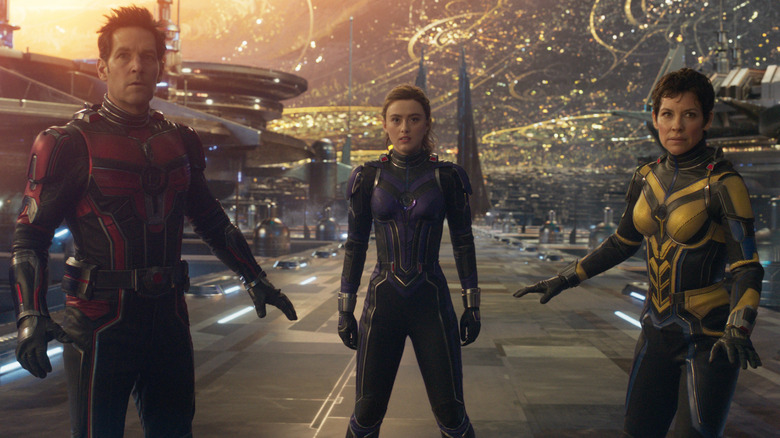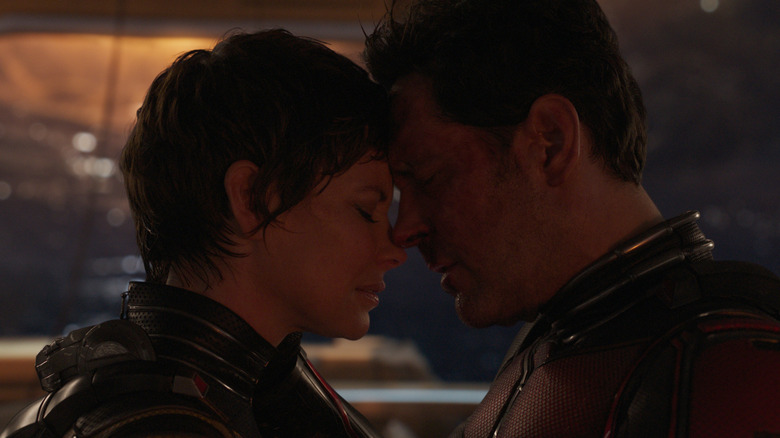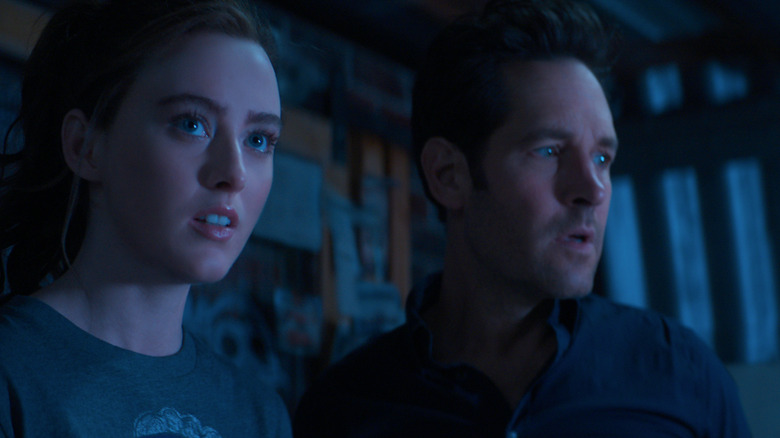Ant-Man And The Wasp: Quantumania Spoiler Review: A Rough Ride In The Quantum Realm
"There's always room to grow." This brief adage is also a quote from a best-selling book within the events of "Ant-Man and the Wasp: Quantumania." The idea, evinced by the author of said book, Scott Lang/Ant-Man, is that the little guy should not be ignored, that David can always take down Goliath precisely because his size seems so un-intimidating that it's easy to look past him. But it's more than a little ironic to hear the words "room to grow" in the middle of a Marvel Cinematic Universe brand deposit/film like this one — because the very nature of the MCU is such that while there may be universes yet to explore, the creative stakes are never going to be too expansive because the status quo must be largely maintained. The MCU is many things, but it's not the epitome of the little guy.
And so it goes with "Quantumania," the third Ant-Man-specific entry in the MCU and the weakest creatively. While many of the names behind and in front of the camera are returning, from director Peyton Reed to stars Paul Rudd, Evangeline Lilly, Michael Douglas, and Michelle Pfeiffer, "Quantumania" veers into darker territory from its opening scene and mostly stays there. Aside from bookending scenes featuring bouncy narration from Rudd, liberal use of the theme to "Welcome Back, Kotter," and a few funny lines from an elderly coffee-house proprietor you may recognize from his unique car ideas in a focus group, "Quantumania" eschews the rapid-fire comedy of its two predecessors (Michael Pena doesn't appear here, for one example) and replaces it with a miasma of drab CGI nonsense and a very dour villain in the Quantum Realm.
If "Quantumania" has anything going for it, it's a briskness of pacing — that this movie is just over 2 hours feels nearly miraculous). After we learn that Scott's living the life of Riley as a post-Blip Avenger, and that his girlfriend Hope (Lilly) maintains a public-facing life of corporate advocacy while also being the Wasp, it's revealed that Scott's teenage daughter Cassie (Kathryn Newton) has been experimenting with a kind of satellite to the Quantum Realm. Before anything else can be said, the three of them, along with Hank Pym and Janet Van Dyne (Douglas and Pfeiffer), are transported to the Quantum Realm, where they find themselves facing a powerful and terrifying villain, Kang the Conqueror (Jonathan Majors), who has some unfinished business with Janet.
It's not easy being green(screen)
Almost all of "Quantumania" takes place in the Quantum Realm, which means that almost all of "Quantumania" is a computer-animated film with human actors placed in front of bluescreen and greenscreen. In the early going, the new MCU brand deposit seems to take its cues from the same pulp genre stories that inspired the recent Disney Animation title "Strange World" (no doubt a coincidence of timing), yet with a less impressive design and a less pleasing color palette. (While the film is being offered in 3D, advance screenings were in 2D. The visuals here would border on incomprehensible in 3D.) Scott, Cassie, Hope, Hank, and Janet are initially split up, with the erstwhile Ant-Man and his daughter learning about the motley group of displaced humans and other creatures who have banded together to fight against Kang, while Hope and her father gradually get a better sense from Janet about what actually happened to her in the Quantum Realm. (The latter plot allows for Hope and Hank to learn about a dalliance Janet had with a local bigwig named Krylar, played by Bill Murray as a riff on his lounge-singer character from "Saturday Night Live" that is as random and brief as it is sadly unfunny.)
Before Kang appears, there's a great deal of portentous and enigmatic dialogue about "him" (and seeing as Kang is a heavy part of the marketing campaign, delaying his arrival is less impactful and more like stalling) and how powerfully scary "he" is. When we do meet this version of Kang — not the same as the flamboyant character introduced in the season finale of Disney+'s "Loki" series — he's gravely serious and dour. The humor surrounding Kang is mostly bottled up in the form of a very unexpected character indeed, MODOK, played by Corey Stoll in a reprisal of sorts of his corporate villain from the first "Ant-Man." MODOK, like Darren (because you surely remember that was the character's name), is a jerk but now he's imbued with powers to fight back against Scott and Cassie. Stoll is funny enough, especially when MODOK grapples with the prospect of not being a jerk (and in his perversely chipper re-introductions to the main group of heroes, who are all duly horrified). If there is a problem, it's that MODOK, when we see Stoll's stretched-out visage, is reminiscent of the CGI nightmare aliens from Disney's flop "Mars Needs Moms." MODOK isn't supposed to look amazing, of course, but the design is fairly off-putting.
The sense of the visually unpleasant extends through much of "Quantumania." While Scott and the others (sans Janet) are surprised to learn how much vaster the Quantum Realm was as opposed to their expectations, what's presented never looks terribly distinctive, as much as some viewers may look at this assorted combination of seemingly heady colors and think it marks a new high in superhero storytelling. The previous snappiness of the other "Ant-Man" movies, which benefited from suitably smaller expectations, is absent, too; while there are scenes where Scott, Hope, and Cassie (who's built herself a suit like her dad's) increase and decrease in height to fight against Kang's baddies, Reed's direction doesn't have the same punch and the fight scenes are mostly unremarkable.
A lot of desperate setup
More to the point: this movie is meant to kick off a new phase of Marvel filmmaking, and is starting the second phase of the Multiverse Saga, while emphatically bringing Kang into the MCU. Even as a table-setting film, "Quantumania" stumbles pretty poorly. There are a few concessions to the idea of how little this all should (or does) work — in the bookending scenes, Scott tells us that his life "doesn't make any sense." That line is meant to speak to how ridiculous it is that a small-time thief became a world-renowned Avenger, and while that's true, it speaks much more to the fact that this movie's stakes seem easier to dismiss than embrace. The film's version of Kang is both domineering — destroying timelines just so he can prove that he can, and being exiled by his fellow Kangs because of it — and fairly easy to take down. It is perhaps meant to be funny that in the finale, Kang dismissively shouts "You talk to ants!" to Scott and then he is subsequently attacked ... by ants. But all that does is serve as a reminder that as powerful as Kang is, he's not that powerful. Whatever else was true of the last Big Bad in the MCU, Thanos, he wound up having a much clearer motive for his insanely villainous acts, and also seemed fairly impossible to thwart.
"Quantumania" is all about setting up Kang as the next impossible foe, and ends up sacrificing the speedy fun of the other "Ant-Man" movies. In the end credits, we are threatened — uh, sorry, promised that "Kang will return." And the two post-credits scenes don't feature our heroes at all: in the first one, we see the many other variants of Kang learning that the Conqueror was killed and deciding to fight back against the Avengers; the second one serves as a teaser for the new season of "Loki," as Loki (Tom Hiddleston) and Mobius (Owen Wilson) are glimpsed at a turn-of-the-century traveling expo, watching a scientist variant of Kang describing how you can manipulate time, much to Loki's horror. Yes, Kang will return. But as talented as Jonathan Majors is — if you have to bring someone new into the fold as such an unavoidable presence, you could do far worse — the prospect of more Kang is less appealing after "Quantumania."
Early in the film, right before the quintet is sent to the Quantum Realm, the others tease Scott when he reminds them again that he helped save the world after the Blip. The sly implication is that, yes, it's all well and good that the Avengers took Thanos out, and that Ant-Man was part of the equation, but ... well, what's next? Intentionally or not, that highlights the true problem of the MCU. There's no question that the saga culminating in "Avengers: Endgame" was successful at the box office and with many audiences (if not all critics). But in the last few years, watching Marvel try to set up a new sprawling saga has only shone a brighter spotlight on the creative issues that cropped up earlier. The quips are more tired, the visuals are less inventive, and the stakes feel less impressive. A sense of desperation has arrived in the Marvel Cinematic Universe, and "Ant-Man and the Wasp: Quantumania" is the first time when that sense has overwhelmed all else. The harder Marvel tries to make this happen, the less likely it is that they'll succeed.


